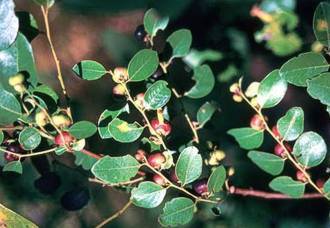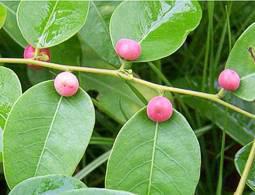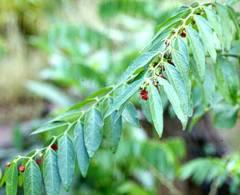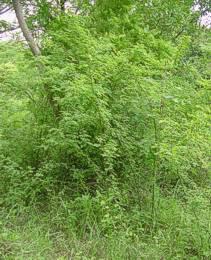Phyllanthus reticulatus
Phyllanthus reticulatus Poir.
Family: Phyllanthaceae
Common names: potato plant, roast potato plant (Eng); aartappelbos (Afr); intaba-yengwe, umchumelo (isiZulu); thethenya (xiTsonga)
Introduction
Phyllanthus reticulatus is usually a dense deciduous shrub or small tree with a distinct smell that is emitted by the minute flowers when they open towards the early evening. This is one of the fascinating characteristic smells of Africa. Despite its name, this plant which belongs to one of the Euphorbiaceae families and is not at all related to the true potato which belongs to the family Solanaceae.

Description
Description
Phyllanthus reticulatus is a many branched shrub, sometimes partially scrambling, usually 1-5 m high, or a small twiggy tree that grows up to 8 m in height. The bark is light reddish-brown or grey-brown with hairy stems when young, which become smooth with age.
The leaves alternate along slender branches. They are up to 25 cm long and appear as leaflets of large pinnate leaves. The leaves are thinly textured, usually hairless. They have a noticeable reddish net-veining which is more visible above than below.

The potato plant has very small greenish-yellow flowers with a reddish tinge. They are clustered on the tips of short slender branches that are about 3 cm long. The flowers appear before or with the leaves. One female and a number of male flowers are grouped together.
The flowers of this plant are responsible for the strange smell of potatoes which is often encountered along river banks in the Lowveld, particularly on spring and summer evenings. It flowers from September to October, but the flowering season can extend from July onwards. P. reticulatus has very small, roundish berry like fruits that are green at first, turning purple-black, 4-6 mm in diameter.

Conservation Status
Status
Phyllanthus reticulatus is listed on the Red List of South African plants 2009 as of Least Concern. A taxon is of Least Concern when after being evaluated against the IUCN criteria, does not qualify for the categories Critically Endangered, Endangered, Vulnerable and Near Threatened, or the South African categories Critically Rare, Rare or Declining. Widespread and abundant taxa are typically listed in this category.
Distribution and habitat
Distribution description
Phyllanthus reticulatus is very common and widespread in the Okavango Delta. It often grows in low altitudes in riverine thickets. It is distributed along the Eastern Cape and KwaZulu Natal coastal areas, Limpopo Province, Zimbabwe and throughout tropical Africa.
Derivation of name and historical aspects
History
The genus name Phyllanthus is based on the Greek word meaning leaf flower (phyll - leaf and anthus - flower); because in some species of the genus the flowers are produced at the edges of leaf-like branches. The species name reticulatus means nettled and refers to the netting of the leaves.
Ecology
Ecology
The purplish-black fruits are eaten by vervet monkeys, birds and small browsers. There are reports from Tanzania that the fruits and the leaves may cause poisoning when browsed in large quantities.
Uses
Use
From Zambia, it is reported that the plant is used as a remedy for anaemia and intestinal haemorrhage while roots and fruit are reported to have been used for criminal poisoning in Zambia. Several tribes as well as the European farmers use the powdered leaf as a local application for sores, burns and venereal sores. The bark and leaf are used as a diuretic.
In Zululand, root bark infusions are taken as emetics or used as bathing charms to conceal secrets from diviners (Palmer and Pitman, 1972b). The Zulus also believe that they can improve their vision by mixing other ingredients, such as the root-bark of the green thorn (Balanites maughami), with this plant and stirring vigorously three times a day to produce froth. The froth is then carefully licked off without using the hands. The frayed twig can be used as a toothbrush. The root is used to make a dark brown to black dye and is often used to colour fishing lines, making them less conspicuous in the water.

Growing Phyllanthus reticulatus
Grow
P. reticulatus grows easily from seeds. Stored seeds should be soaked in water for a day and then be scrubbed with a brush to remove the fleshy part. They must then be sown in trays filled with normal potting soil. They should not be planted too deep as they can easily rot. Trays must be kept in a warm area, away from direct sunlight, but not too dark. The soil must be kept moist, but not wet to prevent seed from rotting. The seeds take 7 to 11 days to germinate. There is a very low success rate in growing potato bush through cuttings.
Potato bush grows best in deep moist soil, but can also tolerate sandy but not too dry conditions. This plant is best planted together with other taller bushes where it can scramble.
References
- Palmer, E. & Pitman, N. 1973. Trees of Southern Africa. Vol I, II, III, A.A. Balkema, Cape Town, South Africa.
- Roodt, V. 1998. Trees & Shrubs of the Okavango Delta, First edition. Briza Publications, Arcadia.
- Van Wyk, P. 1972. Trees of the Kruger National Park. Vols. I & II, Purnell & Sons, Cape Town, South Africa.
- Palgrave, M.C. 2002. Trees of Southern Africa. Third edition. Struik, Cape Town.
- Hutchings, A. 1996. Zulu Medicinal Plants. University of Natal Press, South Africa.
Credits
Mandisa Kondlo
Walter Sisulu National Botanical Garden
June 2010
Plant Attributes:
Plant Type: Scrambler, Shrub, Tree
SA Distribution:
Soil type: Loam
Flowering season: Spring
PH: Neutral
Flower colour: Green, Yellow
Aspect: Full Sun, Afternoon Sun (Semi Shade)
Gardening skill: Average
Special Features:
Horticultural zones








Rate this article
Article well written and informative
Rate this plant
Is this an interesting plant?
User Comments
Cornelius Geldenhuys, South Africa
April 28, 2018 at 8:21 AMGood day. I totally disagree with what is said in this article with regards to the smell. I have lived in the Lowveld and Zambia for over 22 years and the smell is weak to nothing in summer and strong in winter.
Kind regards
Login to add your Comment
Back to topNot registered yet? Click here to register.